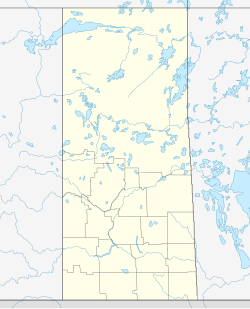Spiritwood is a town in the boreal forest of central Saskatchewan, Canada with a population of approximately 1,000. Its location is 125 km west of Prince Albert and about 110 km northeast of North Battleford at the junction of Highway 3, Highway 24 and Highway 376. As the largest community in the region, the community functions as the major supply, service, and administrative headquarters for the trading area population which includes several First Nation reserves including Witchekan Lake, Big River and Pelican Lake.
Spiritwood | |
|---|---|
Town | |
Location of Spiritwood, Saskatchewan | |
| Coordinates: 53°21′55″N 107°31′07″W / 53.36528°N 107.51861°W | |
| Country | Canada |
| Province | Saskatchewan |
| Rural Municipality | Spiritwood |
| Government | |
| • Mayor | Gary von Holwede |
| • MLA Rosthern-Shellbrook | Scott Moe |
| • MP Desnethé—Missinippi—Churchill River | Georgina Jolibois |
| Area | |
| • Total | 2.95 km2 (1.14 sq mi) |
| Population (2011)[1] | |
| • Total | 916 |
| • Density | 310.0/km2 (803/sq mi) |
| Time zone | UTC−06:00 (CST) |
| • Summer (DST) | UTC−05:00 (DST) |
| Postal code | S0J 2M0 |
| Highways | Hwy 3, Hwy 24, Hwy378 |
| Website | "Town of Spiritwood Website". |
| [2][3] | |
History edit
The district began to be settled around 1911–12; however, growth in the area was slow until the coming of the railway in the late 1920s. The first settlers primarily engaged in ranching. The Spiritwood post office, which had been established in 1923, was named after Spiritwood Lake, North Dakota, the hometown of the first postmaster, Rupert J. Dumond.[4] After the railway arrived, settlers of diverse origins poured into the district and many businesses were established.[5] On October 1, 1935, Spiritwood was incorporated as a village and, by September 1, 1965, the community had grown large enough to attain town status.[5]
This was the scene of the two deaths of RCMP officers in 2006, where after a 12-day manhunt, the suspect surrendered without incident.[6]
Demographics edit
In the 2021 Census of Population conducted by Statistics Canada, Spiritwood had a population of 966 living in 395 of its 422 total private dwellings, a change of 5.8% from its 2016 population of 913. With a land area of 2.91 km2 (1.12 sq mi), it had a population density of 332.0/km2 (859.8/sq mi) in 2021.[7]
Economy edit
Mixed farming predominates and consists primarily of grain production. A Spiritwood company with global connections that focuses on pig genetics, producing breeding stock and commercial swine, has roughly 50 employees. There is some forestry in the region north of Spiritwood.
Attractions edit
The town has a range of recreational facilities.
Once hometown of the annual Silverbuckle Rodeo, a mid-summer attraction for many years, the grandstands are no more. "SpiritFest" is held annually in August. Spiritwood Museum is open seasonally throughout the summer months. The museum showcases the community's history, including an exhibition of antique farm tractors all freshly restored and in running condition. Campground facilities available with 12 sites.
Spiritwood is located in the centre of an area that features six golf courses (three grass greens and three sand greens), six regional parks and 35 lakes, all within a 60-minute drive. The lakes have fishing for perch, walleye, pike and trout. Its close proximity to lakes and parks with camping, boating, fishing, golfing, hunting, cross country skiing, snowmobiling and hiking.
Infrastructure edit
There is sewer/water capacity for 1,500 residents to allow for 50% community growth. Free Wi-Fi, Cellular service and Cable television are available.
Transportation edit
There is no bus service available to Spiritwood, so that with the railway gone and grain elevators closed, all bulk commodities including fertilizers, fuel, grain and livestock are transported by truck. Hwy 3, Hwy 24 and Hwy 376 provide access.
Spiritwood Airport (TC LID: CKH7), now defunct, was an uncontrolled public grass strip operated by Town of Spiritwood.
Leoville Airport (TC LID CJT9), is available 32 km north of Spiritwood, located 2 NM (3.7 km // 2.3 mi) west of Leoville, Saskatchewan. This is a public airport operated by the Village of Leoville with two runways. (Runway Direction 12/30; Length 2,400 ft // 732 m; Surface GRAVEL. Runway Direction 16/34; Length 3,400 ft // 1,036 m; Surface TREATED GRAVEL).
Health Care edit
Northern Lakes Health Committee (NLHC), a volunteer group, was set up at Spiritwood in May 2010 with directors selected to represent each of the surrounding communities, organizing fundraising events to support a physician recruitment initiative through a subcommittee.
Since 2006, Spiritwood & District Health Complex was closed "temporarily", leaving the community at large without acute care facilities. Completed in the fall of 2001, this modern $3.6 million facility encompasses approximately 8,000 square feet (740 m2) of new construction and 4,400 square feet (410 m2) of renovated space which is linked to the former Spiritwood Hospital and Idylwild Lodge to serve as one integrated facility.
References edit
- ^ "2011 Community Profiles". Statistics Canada. Government of Canada. Retrieved 2012-11-09.
- ^ Government of Saskatchewan, MRD Home. "Municipal Directory System". Retrieved 2012-11-09.
- ^ Commissioner of Canada Elections, Chief Electoral Officer of Canada (2012). "Elections Canada On-line". Retrieved 2012-11-09.
- ^ "Library and Archives Canada-Post Offices and Postmasters". Retrieved 2012-11-09.
- ^ a b "Town of Spiritwood Website".
- ^ "Convicted killer Dagenais gets another day in court". Saskatoon.ctvnews.ca. Retrieved 2012-09-19.
- ^ "Population and dwelling counts: Canada, provinces and territories, census divisions and census subdivisions (municipalities), Saskatchewan". Statistics Canada. February 9, 2022. Retrieved April 1, 2022.
- ^ "2011 Community Profiles". 2011 Canadian Census. Statistics Canada. March 21, 2019. Retrieved 2012-05-30.
- ^ "2006 Community Profiles". 2006 Canadian Census. Statistics Canada. August 20, 2019.
- ^ "2001 Community Profiles". 2001 Canadian Census. Statistics Canada. July 18, 2021.
